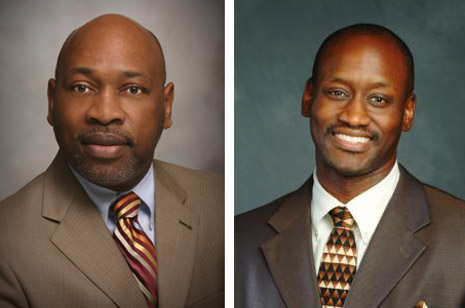FAYETTEVILLE, Ark. – Remembrances in Black: Personal Perspectives of the African American Experience at the University of Arkansas, 1940s—2000s, edited by Charles F. Robinson and Lonnie R. Williams ($45.00 cloth), has been published by the University of Arkansas Press.
Seventy-eight oral histories are included in the book, which also provides an appendix of interviewee biographies and a timeline. Remembrances is organized chronologically and begins with interviews from George W.B. Haley and Christopher C. Mercer Jr., each of whom entered the University of Arkansas School of Law in 1949, a year after Silas Hunt became the first African American student admitted to the university since reconstruction.
Charles F. Robinson is vice provost for diversity at the University of Arkansas, and Lonnie R. Williams is associate vice chancellor for student affairs at Arkansas State University, Jonesboro. Williams is also an alumnus of the University of Arkansas education and business colleges.
 |
Some of the interviewees included in the book are George Haley, former U.S. ambassador to Gambia; the late E. Lynn Harris, a best-selling author; Gene McKissic, who was the first African American student body president; Janis Kearney, author and former White House diarist for Bill Clinton; Gordon Morgan and Margaret Clark, the first African American faculty members; and Rod McDavis, the first African American dean of a college at the university.
According to Robinson, one unusual element of the black experience at the University of Arkansas is that it was the first southern institution to desegregate without threat of litigation. This voluntary desegregation unfortunately allowed the university a slower pace at achieving real integration because the institution was not under the public scrutiny that other schools like the University of Alabama and Mississippi were.
“Athletics is a good example,” Robinson said. “Despite the fact that Silas Hunt registered for campus in 1948, the UA did not have its first African American scholarship football player take the field until 1970. The University of Alabama, forced to desegregate in 1963, had its first black football scholarship athlete in 1971.”
Memories, positive and negative, are still potent for the interviewees, according to Williams. He recalls speaking to Merike Manley, who was elected the first African American homecoming queen in 1982. In addition to several other slights, she recalls that the vote was conducted three times, a parade was cancelled and her election was blatantly under publicized. “The pain of how she was treated is still very much alive in her today,” Williams said.
Publication of Remembrances in Black was supported by the Gordon and Izola Morgan Publications Fund.
Topics
Contacts
Melissa King, director of sales and marketing
University of Arkansas Press
479-575-7715,
